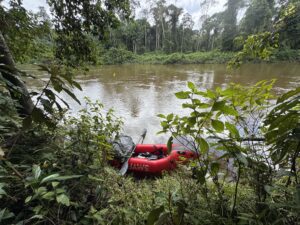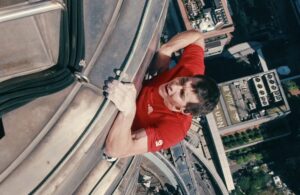Toronto-based Mario Rigby has an unusual background for an adventurer. He represented his native Turks and Caicos at 400m in track and field, then became a personal trainer. Then in 2015, he decided to trek 12,000km down the length of Africa. He flew to Cape Town, South Africa for a two-year journey along the east coast towards Egypt.

Rigby’s route. Photo: Mario Rigby
He left from Cape Point, the extreme southern tip of the continent, and averaged 25km per day in the early stages. “My conditioning was good, but nothing prepared me for the terrain and environment,” Rigby explained.
His course took him along South Africa’s Garden Route and the Wild Coast before he elected to tweak his itinerary. He kept to the coast as far as Malawi, then kept east through Mozambique rather than veer through Zimbabwe and Zambia.
His decision proved risky. Near the Save River in southern Mozambique, he walked into an unofficial war zone. Despite the old peace accords of 1992, the underlying tensions of the 15-year Mozambican Civil War have remained. The militant organization Resistência Nacional Moçambicana (RENAMO) remains active in the central part of the country. To avoid the sporadic fighting, Rigby joined a government military convoy to proceed across the river. Shortly after, the convoy was ambushed, and Rigby had to take cover with the soldiers as they returned fire. Thankfully, he came out of the terrifying ordeal unscathed: The resistance fighters eventually retreated, and the convoy continued.

No sign of RENAMO on this quiet road in Mozambique. Photo: Mario Rigby
Rigby’s brush with mortality left him mentally shaken, but it did help, at least temporarily, to relieve one of the biggest hurdles of his expedition. At times during the two-year trek, Rigby felt he was coasting: “I started to completely lose the fear factor, the excitement. Losing fear is dangerous because you end up doing things that can get you in a lot of trouble.”

Meeting Samburu women on the side of the road in Kenya. Photo: Mario Rigby
Rigby exited Mozambique, finally out of harm’s way, and made a snap decision to kayak the length of Lake Malawi. With no kayaking experience, he took two months to cover the 550km. His slow pace was due not only to inexperience. Once, suspicious police detained him for three days. But the main culprits were the hospitable villages in Nkhata Bay, “an oasis where I stayed for a couple of weeks.”

Pitching camp with a few friends on the shores of Lake Malawi. Photo: Mario Rigby
Rigby chose to travel light, with a bare minimum of clothing and gear. He varied his food and water supplies, “depending on terrain, edible wild vegetation, coastal approximation and population.” He carried heavier loads of food and water, up to 12kg, for inhospitable areas such as Marsabit County in northern Kenya.

In places such as Marsabit County in northern Kenya, above, supplies were harder to come by. Photo: Mario Rigby
The extreme length of his journey also meant that using tablets for malaria prevention was out of the question. Malaria tablets are usually recommended for no more than three months and threaten several nasty side effects, including psychosis.
Instead, he carried them in case he suffered malarial symptoms, a decision that proved sensible. On the Malawi-Tanzania border, Rigby came down with cerebral malaria, the most severe form of the parasite. He was laid low for three weeks, under the watchful eyes of some travelling German nurses. Despite this scare, Rigby says he was very lucky with his health: “I was only ill twice. The second time was when I ate Chinese food in one of Kenya’s largest malls!”

Walking with Gelada monkeys in the Semien Mountains of Ethiopia. Photo: Mario Rigby
Back on his feet, Rigby racked up the kilometres, averaging around 45km per day as he moved up through East Africa. In February 2018, he completed his 12,000km expedition in Egypt. He was pleased to have remained positive in times of loneliness, but also discovered that the experience tested his friendships with those back home in Toronto. Nevertheless, he’s returning to Africa for another expedition, with a twist: Dubbed Project EVA, he will drive an electric vehicle around the entire continent.






